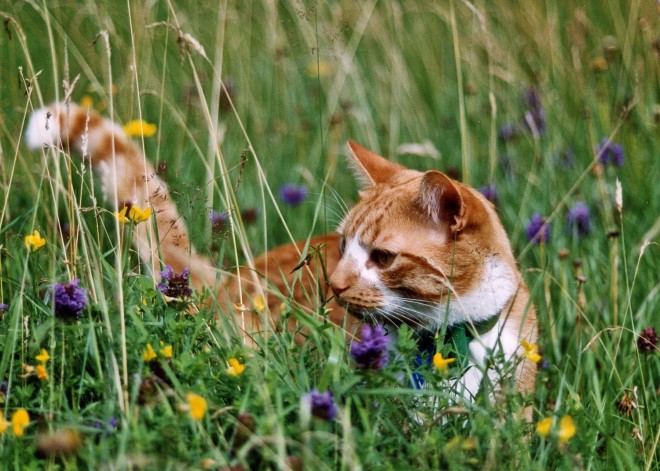Garden Hazards
Top tips to keep your cat safe in the garden this summer
Summer’s here and just like gardeners, cats will be enjoying the long days and warm weather amongst the flowers and shrubs.
Whilst most will be perfectly safe in the great outdoors, there are a host of potential garden hazards for cats – so Cats Protection has compiled a list of tips to keep them safe this summer.

Lilies, barbecues and too much sun exposure can all prove harmful to felines. Many people are aware of the risks connected with sunbathing in humans but do not realise that cats can be affected as well. Whilst the sun can be very damaging, there are also lots of other potential dangers to cats during the summer months so we would advise owners to be aware of these hazards.
Cats Protection’s top tips for keeping cats safe this summer are:
· Ensure your cat is fully vaccinated to protect against diseases and parasites. Neutering is also vital to prevent unwanted kittens being born and to reduce roaming, keeping your cat closer to home.
· Cats with white fur, including those with white ears or noses, can be susceptible to sunburn during the summer months and sun exposure can be a trigger for a type of cancer. The best way to protect your cat is to try to keep him indoors during the hottest part of the day and provide shade from plants and trees.
· Be aware of poisonous substances in your shed and garage which cats may be able to access. Antifreeze, disinfectants, insect and pest killers can all be lethal to cats and should be kept well out of your cat’s reach.
· Avoid plants which can be dangerous to cats. Lilies in particular can be lethal if a cat ingests pollen from its fur after brushing against them. A full list of plants that are dangerous to cats can be found on the International Cat Care’s website www.icatcare.org.
· Choose cat-friendly plants such as catnip (Nepeta cataria), mint, cat thyme (Teucrium marum) and lavender. A patch of longer grass can provide a soft bed and cats may also nibble on it to help cough up hairballs, while logs make excellent outdoor scratching posts.
· If you have a pond, cats may be tempted to drink from it. To reduce the risk of them falling in, place some wire mesh securely over the pond, or make sure that there is a low edge so it is easy for a cat to get out. Ensure that any water butts also have a lid on them.
· Use humane methods to keep your cat away from wildlife nesting areas or sections you do not want them to use. Cats dislike the smell of citrus fruit peel and can also be deterred using chicken manure or pellets of lion dung, available from pet shops. Cats will also be put off by materials that feel uncomfortable under their paws such as broken egg shells, stone chippings and prickly plants.
· Take care with barbecues. If you are planning to enjoy some al-fresco dining during the summer, make sure barbecue coals are properly cooled with water as your cat can suffer nasty burns if he or she jumps onto them once you are finished.
· Keep the doors of sheds and greenhouses shut. Be careful not to accidentally trap cats inside outbuildings during hot weather.
· Ensure your cat has appropriate flea treatment. Fleas thrive in hot weather, so make sure your cat is protected against them. Your vet will be able to advise on what treatment is most suitable for your pet.
· Cats Protection recommends microchipping as a safe, effective way of identifying your cat should he become lost when outdoors.